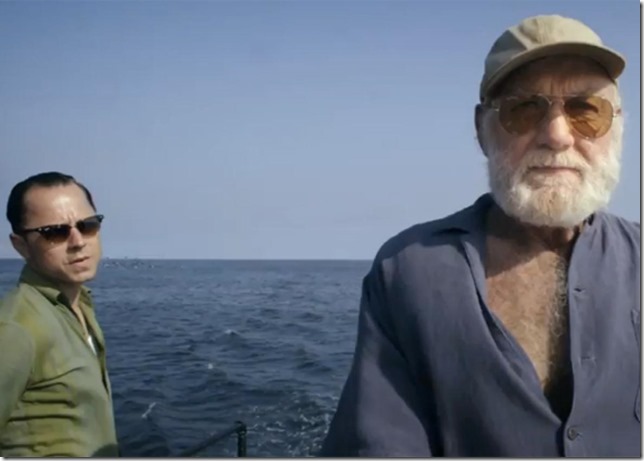Papa: Hemingway in Cuba, a memoiristic drama about Ernest Hemingway’s paranoid twilight in Havana and the Miami Globe reporter he “adopts” into his entourage, holds a significant distinction: It’s the first Hollywood film to shoot on location in Cuba since the 1959 revolution, an achievement reached over a decade of legal wrangling.
It’s a shame that it was all in vain. The flavor of this exciting city in this tumultuous country must have been jettisoned on the cutting-room floor, because ambience is woefully unexplored in the airless and artless final product. It’s worse than that, even: The movie looks positively fake, the Cuba of a green-screened fantasy.
The screenplay is not without potential. Writer Denne Bart Petitclerc, who died in 2006, scripted the film from his memories of befriending “Papa” Hemingway at the dawn of the 1960s, the revolution commencing apace. In the film, he’s renamed the more Anglo-friendly Ed Myers and played by Giovanni Ribisi, who is most certainly too old for the role of cub reporter, but that’s the least of the film’s problems.
Ed is an ardent Hemingway devotee who strikes up a friendship with the great author (the stage actor Adrian Sparks, a dead ringer with a timeworn beard and impressive gut) after Hemingway responds to his letter of admiration. One trip to Papa’s Havana compound becomes another, and then another, and while bodies pile up a stone’s throw from Hemingway’s luxurious pool, Ed is granted a front-row seat to Papa’s unraveling, in a haze of resentment, booze, pistols and artistic sturm und drang.
The Hemingway who eventually explodes in impotent rage is at least preferable to the Ernie of the earlier portions of Papa, a kind of bloated, sensitive pasha dispensing torturous bromides like daiquiris. Sparks has played Hemingway in a one-man show, but even this skilled thesp is adrift without a paddle, forced to spout platitudinous dialogue that would earn nothing but derision from Hemingway himself.
Petitclerc’s screenplay is filled with forehead-slapping clichés, arch exposition and story developments that insult characters’ intelligence, but his earnest attempts at putting a personal stamp on a historic flashpoint are done a further disservice by Bob Yari’s seemingly incompetent direction. Scenes are cut together with neither a sense of rhythm nor a coherent geometry. Yari shot the film on 2:39:1 widescreen but has no idea how to fill a frame. There is a conspicuous lack of wide shots in Papa, with the director preferring to shoot almost entirely in extreme close-ups against possibly artificial backdrops lacking depth-of-field or even ambient noise. It’s as if this entire picture was fixed in post — and poorly patched at that, with the filmic Band-Aids present throughout.
Yari’s pacing of action is no better. Even the theoretically riveting rows between Hemingway and wife Mary (Joely Richardson, whose performance is unsalvageable) lack the crackle of real life, proceeding with inert languor. Likewise, Yari’s depiction of revolutionary violence on the streets of Havana is offensively aesthetic: The corpses look arranged for photographic prettiness, the upturned cars staged just so, the gunfire implausibly distant.
In essence, the final product of Papa looks like an early work print, unsuitable for public distribution. It occurred to me, toward the end of the movie, that movies like Spotlight win Oscars not just because of their important subject matter. It’s because they stick together with the invisible glue of life. In Spotlight, there was never a question that what we were experiencing was unvarnished authenticity. Papa is the exact opposite: Never, at any point, does it approach formal credulity. It just sits on the screen in pieces.
PAPA: HEMINGWAY IN CUBA. Director: Bob Yari; Cast: Giovanni Ribisi, Adrian Sparks, Joely Richardson, Minka Kelly, James Remar; Distributor: Yari Film Group; Rating: R;Opens: Today at Cypress Creek, Regal Magnolia, Shadowood, Boynton Cinema 8, Movies @ Lake Worth, Pompano 18
